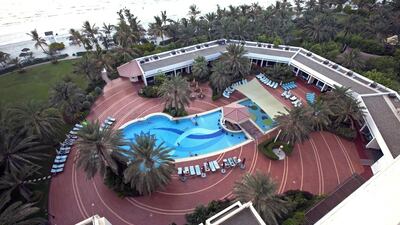DUBAI // Hotels in the emirate are set to become greener with the launch of an initiative to reduce the hospitality industry’s carbon footprint.
With about 700 hotels operating in Dubai, and plans for 300 more to open before 2020, the environmental impact of catering to millions of guests each year, as well as the drain on the emirate’s water and power resources, is considerable.
The use of alternative energy sources in solar power, greener transport such as electric vehicles, better waste management and recycling systems, and making greater use of locally sourced food are some of the ideas the Department of Tourism and Commerce Marketing (DTCM) is implementing.
Speaking at a Michigan State University conference on higher education, DTCM executive director Yousef Lootah said there was a “very holistic plan to control the effect we have on Dubai, on emissions, anything that affects the environment”.
“The green tourism plan takes into consideration what is needed to be done pro-actively to make an impact that sticks.”
Last year, Dubai attracted 14.2 million visitors. With plans to host 20 million tourists a year by 2020, it is important to have strong environmental measures in place to manage such high numbers. Mr Lootah called education key.
“It’s very important, especially for unskilled people in the industry who are not aware of the impact their actions. Above that, managers and decision makers they need some education about sustainability,” he said.
“Before it’s been seen as something ‘nice to have’ but it should be the way we conduct ourselves and do business in the future. There’s no two ways about it. We need to do this responsibly. The first thing is training and education.”
A “tool kit” is being devised for hotels to train staff and discussions are under way between Dewa and Dubai Municipality to ensure all bases are covered, said Mr Lootah.
“If in the past people didn’t pay attention to it, that’s changed and will continue to change as we make the green programme more embedded into the way hotels operate.”
The move to make hotel’s more eco-friendly has been gaining momentum in recent years. The UK hotel group Whitbread opened two low-carbon English properties in Tamworth and Burgess Hill that, on average, use 50 to 80 per cent less energy than properties of a similar size. This has been achieved by adopting green technologies, including ground-source heat pumps, high-efficiency thermal insulation, LED lights and sensors that turn lights off when not in use.
Mark Sawkins, general manager of Fairmont The Palm, said his property already used LED lights in public areas, waste reduction policies and water flow reducers in all guest bathrooms.
“The hotel is committed to providing the team with regular environment training, including waste recycling and management to strengthen and improve knowledge and encourage involvement,” said the German.
Basant Kushwaha, director of engineering at the Kempinski Hotel, Ajman, oversees the property’s green policy. Last year, he finished his masters thesis on sustainability within the UAE’s hospitality industry.
The Nepali said training from the DTCM would greatly encourage hotel operations to implement better green policy but financial incentives would also have a big impact.
“Five star hotels in the UAE make a big impact on the environment so regulation is necessary. There is a need for training so people see the environmental impact and cost savings these measures can bring.”
The Kempinski saves Dh5,000 a day by recycling water for irrigation. A solar panel installation to heat water saves Dh20,000 a month in diesel costs.
Mr Kushwaha points out that the fuel is one of the biggest factors affecting carbon footprint.
“A DTCM policy making many things compulsory, such as solar heating and the use of LED lighting, is good and will help reduce the damage being done by the industry. It’s important that there is both regulation and implementation. People will say these things aren’t feasible otherwise, but this makes it impossible not to comply.”
mswan@thenational.ae

